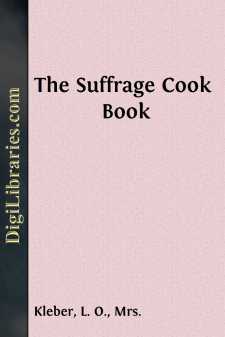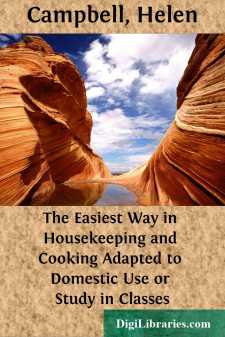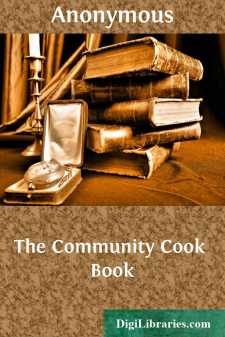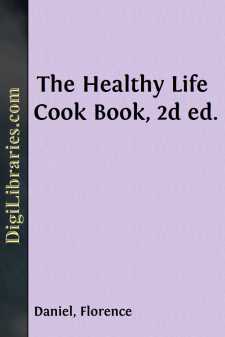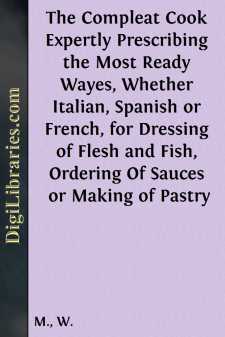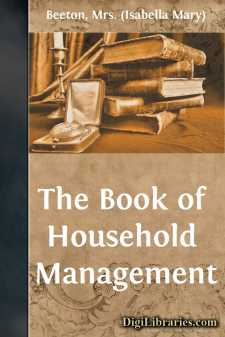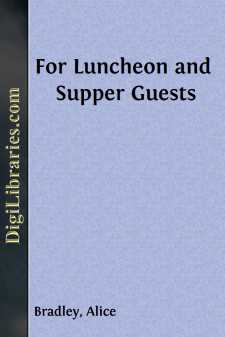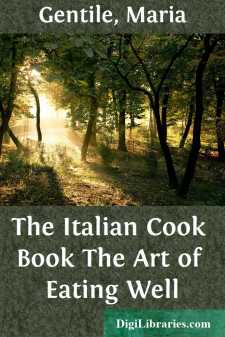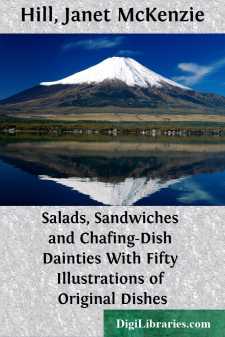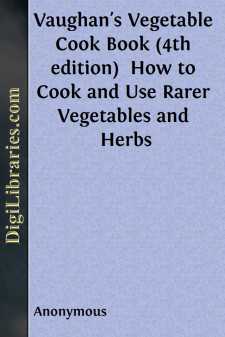Categories
- Antiques & Collectibles 13
- Architecture 36
- Art 48
- Bibles 22
- Biography & Autobiography 813
- Body, Mind & Spirit 142
- Business & Economics 28
- Children's Books 15
- Children's Fiction 12
- Computers 4
- Cooking 94
- Crafts & Hobbies 4
- Drama 346
- Education 46
- Family & Relationships 57
- Fiction 11828
- Games 19
- Gardening 17
- Health & Fitness 34
- History 1377
- House & Home 1
- Humor 147
- Juvenile Fiction 1873
- Juvenile Nonfiction 202
- Language Arts & Disciplines 88
- Law 16
- Literary Collections 686
- Literary Criticism 179
- Mathematics 13
- Medical 41
- Music 40
- Nature 179
- Non-Classifiable 1768
- Performing Arts 7
- Periodicals 1453
- Philosophy 64
- Photography 2
- Poetry 896
- Political Science 203
- Psychology 42
- Reference 154
- Religion 513
- Science 126
- Self-Help 84
- Social Science 81
- Sports & Recreation 34
- Study Aids 3
- Technology & Engineering 59
- Transportation 23
- Travel 463
- True Crime 29
The Suffrage Cook Book
by: L. O. Kleber
Description:
Excerpt
Introduction
There are cook books and cook books, and their generation is not ended; a generation that began in the Garden of Eden, presumably, for if Mother Eve was not vastly different from her daughters she knew how to cook some things better than her neighbors, and they wanted to know how she made them and she wanted to tell them.
Indeed, it has been stated that the very first book printed, a small affair, consisted mainly of recipes for "messes" of food, and for remedies for diseases common in growing families.
Whether the very first book printed was a cook book or not, it is quite true that among the very oldest books extant are those telling how to prepare food, clothing and medicine. Some of these make mighty interesting reading, particularly the portions relating to cures for all sorts of ills, likewise of love when it seemed an ill, and of ill luck.
And who wouldn't cheerfully pay money, even in this enlightened day, for a book containing recipes for just these same things? For in spite of our higher civilization, broader education, and vastly extended knowledge, we still believe in lucky days, lucky stones, and lucky omens.
These formed no inconsiderable part of the old time cook book, and no doubt would constitute a very attractive feature of a modern culinary guide. However, hardly anyone would confess to having bought it on that account.
In these later times professors of the culinary art tell us the cooking has been reduced to a science, and that there is no more guess work about it. They have given high sounding names to the food elements, figured out perfectly balanced rations, and adjusted foods to all conditions of health, or ill health. And yet the world is eating practically the same old things, and in the same old way, the difference being confined mainly to the sauces added to please the taste.
Now that women are coming into their own, and being sincerely interested in the welfare of the race, it is entirely proper that they should prescribe the food, balance the ration, and tell how it should be prepared and served.
Seeing that a large majority of the sickness that plagues the land is due to improper feeding, and can be prevented by teaching the simple art of cooking, of serving and of eating, the wonder is that more attention has not been given to instruction in the simpler phases of the culinary art.
It is far from being certain that famous chefs have contributed greatly to the health and long life of those able to pay the fine salaries they demand. Nor are these sent to minister to the sick, nor to the working people, nor to the poor. It would seem that even since before the time of Lucullus their business has been mainly to invent and concoct dishes that would appeal to perverted tastes and abnormal appetites.
The simple life promises most in this earthly stage of our existence, for as we eat so we live, and as we live so we die, and after death the judgment on our lives. Thus it is that our spiritual lives are more or less directly influenced by our feeding habits....


